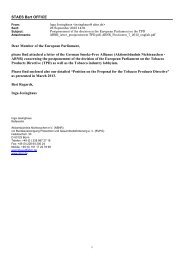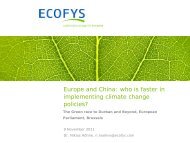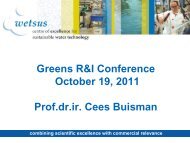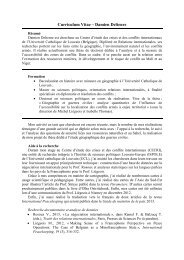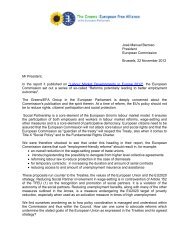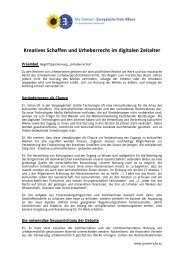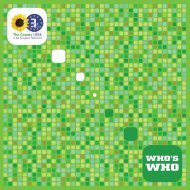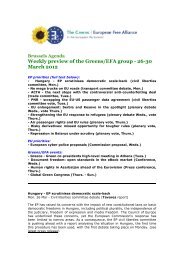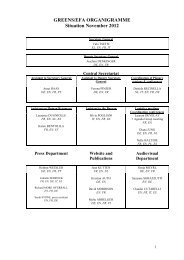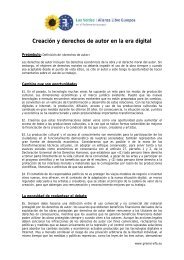Agro-Biotechnology: - The Greens | European Free Alliance
Agro-Biotechnology: - The Greens | European Free Alliance
Agro-Biotechnology: - The Greens | European Free Alliance
Create successful ePaper yourself
Turn your PDF publications into a flip-book with our unique Google optimized e-Paper software.
Need for regulation | Cloned farm animals - a ‚killing application‘? | 33<br />
5. Need for regulation<br />
<strong>The</strong> <strong>European</strong> Commission has started a process designed to regulate products<br />
derived from cloned animals under the Novel Food Regulation 31 . Transparency<br />
and measures for the effective control of possible entry points into the markets<br />
for farm and food products derived from cloned animals and their offspring<br />
should be in place before such products come to the market. <strong>The</strong>re are however<br />
serious doubts whether the Novel Food Regulation can meet this challenge.<br />
5.1 Which products are already on the EU market?<br />
Suk et al. (2007) compiled an overview of potential products that could hit the<br />
markets within the next few years 32 .<br />
2005 to 2010: Semen and offspring from cloned cattle and milk, meat and<br />
derivates from offspring of cloned cattle; Semen and offspring<br />
from cloned pigs, and pig meat and derivates from offspring of<br />
cloned pigs.<br />
2010 to 2015: Cloned cattle and milk, beef and derivates from cloned cattle;<br />
Cloned pigs, pig meat and derivates from cloned pigs.<br />
<strong>The</strong> question arises as to whether these products have already reached the EU<br />
market without being noticed. On the whole this is very likely. <strong>The</strong> import of<br />
semen from cloned animals or even the import of embryos is not prohibited.<br />
Currently, the EU buys $23 million worth of bull semen from the US every<br />
year 33 . Testbiotech questioned Heiner Niemann, ViaGen and customs authorities<br />
in Germany about imports of semen from cloned animals. <strong>The</strong>y did not<br />
provide any answers apart from the information that imports were possible. In<br />
2007 it was known that in the UK, offspring of cloned cows had been born after<br />
cloned embryos had been imported. 34 Government authorities said that the<br />
import of cloned embryos was legal because EU regulations do not differentiate<br />
(Idel, 2007). Swiss authorities are convinced that semen from cloned cows has<br />
reached the country and that several hundred offspring are alive and their<br />
products are likely to have reached the food market 35 .<br />
Quite probably material from cloned farm animals has already reached the<br />
EU and has been disseminated within the EU. Such products might even have<br />
entered the food chain in <strong>European</strong> markets. This situation needs to be redressed<br />
urgently by a new <strong>European</strong> legislation. It requires effective measures<br />
to prevent products penetrating the markets without control and transparency.<br />
31 http://eur-lex.europa.eu/LexUriServ/LexUriServ.do?uri=COM:2007:0872:FIN:EN:PDF<br />
32 table, taken from EGE 2008, citing Suk et al, 2007<br />
33 <strong>The</strong> Wall street online January 2008<br />
34 http://www.dailymail.co.uk/news/article-1024578/Eight-clone-farm-cows-born-Britain--meat-salemonths.html<br />
35 http://www.bag.admin.ch/themen/lebensmittel/04861/05316/index.html?lang=de



